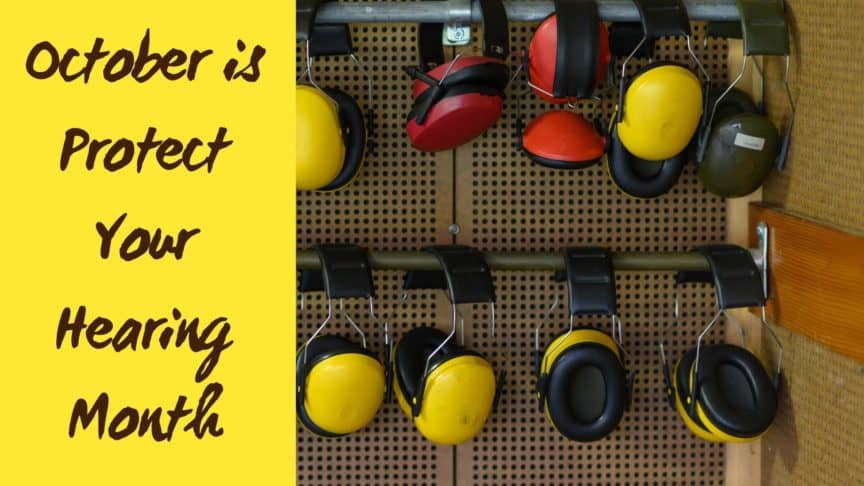How much do you know about your hearing health? Many Americans don’t think about their hearing until something goes wrong. That’s why we’re joining the national awareness campaign: Protect Your Hearing Month. Every October we raise awareness about noise-induced hearing loss, and how protecting your hearing can make all the difference in maintaining your hearing health.
How Do We Hear?
Let’s start by talking about our hearing system. When sound waves move through the air, the shape of the outer ear acts as a funnel, directing sounds down the ear canal. Here the sounds strike the eardrum or middle ear. This vibration causes movement in the fluid-filled middle ear.
The middle ear, or cochlea, is a spiral-shaped cavity, lined with tiny hair cells called cilia. When the fluid moved, these tiny cells also move. The cells send electrical signals to the brain, and the auditory system analyzed all these signals. The electrical signals indicate both pitch and volume. And that’s how you hear sound.
What is Noise-Induced Hearing Loss?
This incredible system lets you hear all the sounds around you, from the softest whisper to the loudest roar. However, the cells that make it all happen, the cilia, are easily damaged. Loud noises can damage or even destroy these delicate cells.
Unfortunately, once these cells are damaged, they can’t be repaired. When you lose these cells in your inner ear, you’ll notice that you can’t hear certain sounds. For example, noise-induced hearing loss often causes hearing loss in higher pitches. So you may have a hard time hearing high sounds unless they’re very loud.
What Sounds Cause Noise-Induced Hearing Loss?
We’re surrounded by loud noise every day. Traffic noise, workplace noise, or even listening to music with the volume too high can cause hearing loss.
Any sounds louder than 85 decibels (dB) can cause hearing loss. A great way to find out more about the sounds around you is by downloading a free decibel reader app and check the volume during some of your everyday activities.
Sounds over 85 dB include:
- Lawnmower – 90 dB
- Leaf blower – 95 dB
- Subway – 95 dB
- ATV or motorcycle – 95 to 100 dB
- Chainsaw – 100 dB
- Music concert or sports crowd – 110 to 115 d
- Emergency sirens – 120 dB
- Gunshots – 140 dB
Personal Listening Devices
One common cause of hearing loss is listening to music or audio using earbuds. With the volume turned all the way up, sounds can top 105 dB! And these sounds are being blasted directly into your ear canals. In the past few years, we’ve seen an increase in hearing loss among teens ad younger adults who have damaged their hearing with unsafe listening practices.
If you listen to music all day every day, turn down the volume! You could be risking your hearing health. Experts suggest that you listen at 60% volume, and never turn up the volume higher than that. It’s also a good idea to take breaks from listening so you don’t tire the cells in your ears. Every 60 minutes turn off the tunes, take out your earbuds, and let your ears rest.
Do you use music to block distracting background noise? Music can help you focus, but make sure you’re listening safely. Noise-canceling earbuds or headphones make it easy to block out background noise without turning up the volume to unsafe levels.
Find Out More About Your Hearing Health
Take control of your hearing health and book a hearing test. Find out exactly what sounds you’re hearing and discover if you have any hearing loss. We’ll give you suggestions for the best hearing protection so you can prevent noise-induced hearing loss.
If you’ve experienced hearing loss, we’re here to help. We work with the world’s leading hearing aid manufacturers to bring you top-quality hearing devices. Whether you want a Behind-the-Ear device, an In-the-Ear hearing aid, or even a Completely-in-the-Canal device, we’ll help you find the perfect fit.
Treating hearing loss early will help you manage your hearing health. You’ll be able to hear without straining, and you won’t be tempted to turn up the volume on the TV, during calls, or when listening to music. You’ll also be able to hear sounds more clearly and enjoy every conversation with ease.



